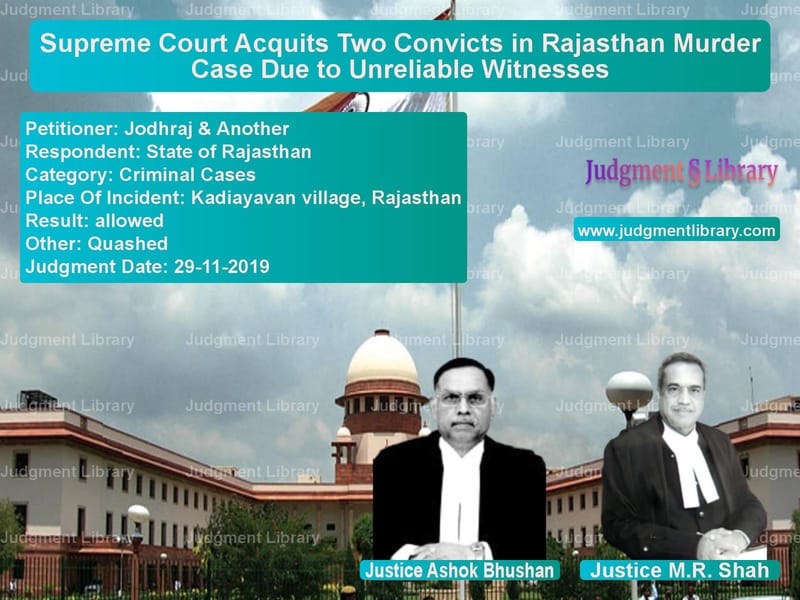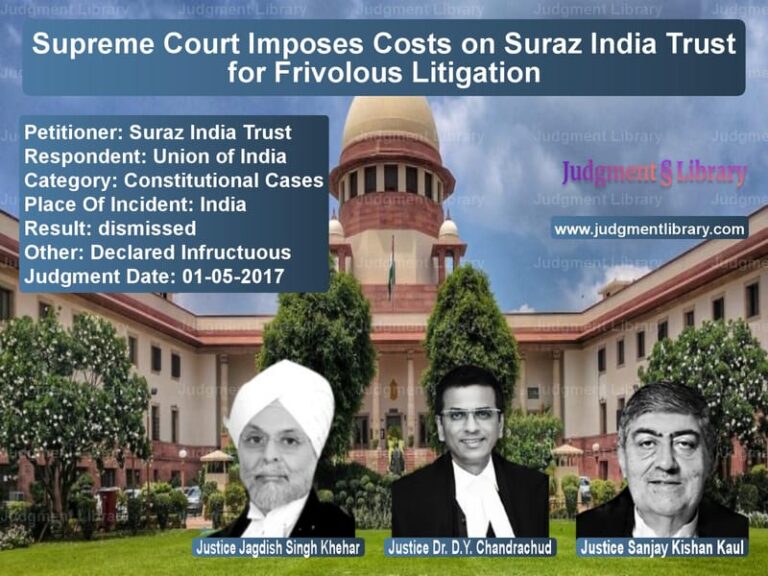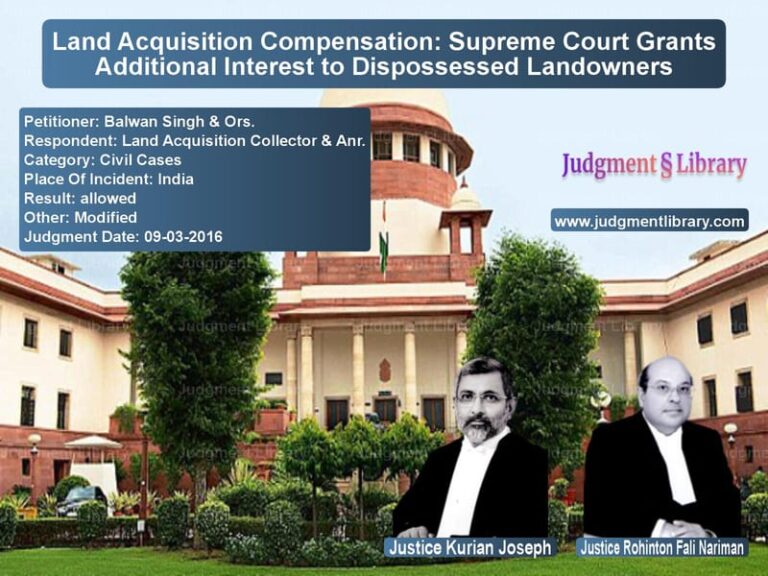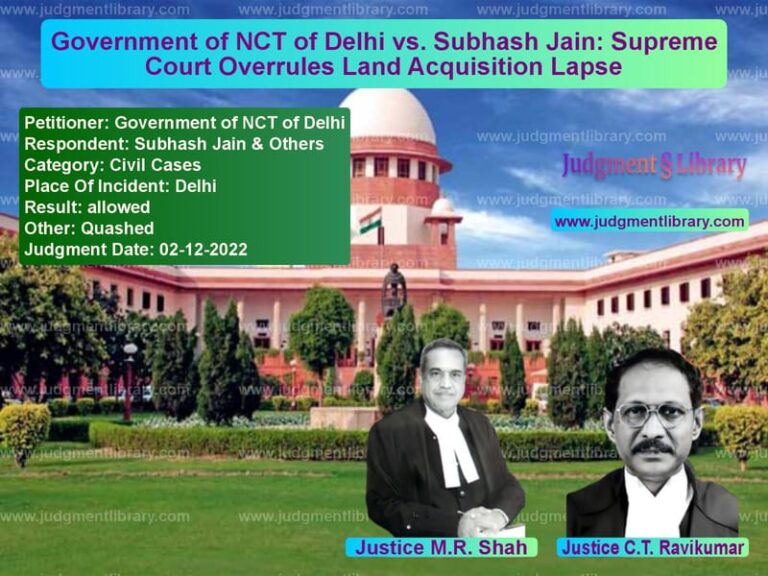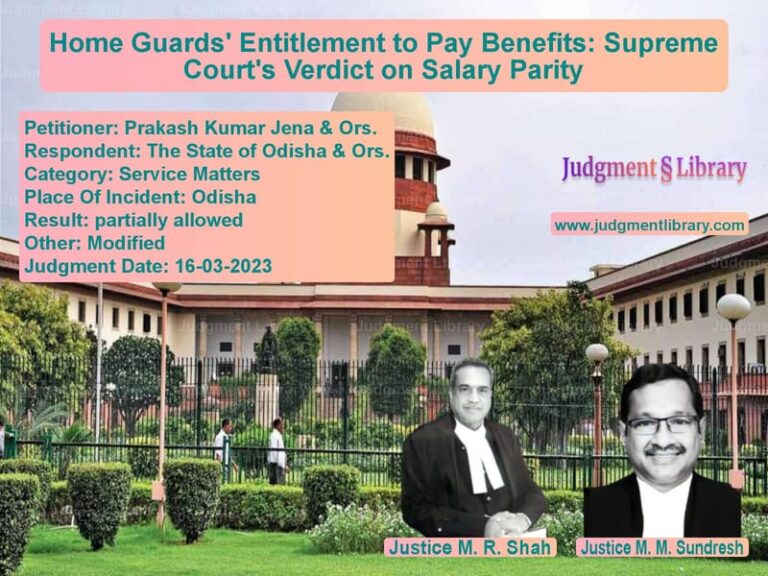Supreme Court Acquits Two Convicts in Rajasthan Murder Case Due to Unreliable Witnesses
The Supreme Court of India, in the case of Jodhraj & Another vs. State of Rajasthan, overturned the conviction of two accused in a murder case from 2005. The case revolved around the killing of Hariram in Kadiayavan village, Rajasthan, where a group of 14 individuals allegedly attacked and caused his death. The judgment is significant as it highlights the importance of reliable witness testimonies in criminal trials.
Background of the Case
On May 22, 2005, at around 9:30 PM, a group of 14 individuals, including Jodhraj, Jagdish Prasad, and Bhanwar Lal, allegedly formed an unlawful assembly and attacked Hariram. The injuries inflicted on Hariram were severe, including:
- Abrasion on the right side of the forehead.
- An incised wound on the right side of the neck.
- A deep incised wound on the abdomen, exposing intestines, which was grievous and life-threatening.
The prosecution alleged that the attack was premeditated and motivated by an earlier dispute.
Trial Court Verdict
The trial court convicted five accused, including Jodhraj and Jagdish Prasad, under Sections 148, 302/149, and 379 of the IPC. The court acquitted the other nine accused, giving them the benefit of the doubt.
The convicted accused appealed to the Rajasthan High Court, and the State also appealed against the acquittal of Bhanwar Lal.
High Court Ruling
The Rajasthan High Court delivered a mixed verdict:
- Acquitted Bhanwar Lal, ruling that the prosecution’s main witnesses, PW2 (Om Prakash) and PW3 (Ram Dayal), were unreliable.
- Upheld the conviction of Jodhraj and Jagdish Prasad, relying on the same witness testimonies.
Following this decision, both the convicted accused and the State approached the Supreme Court.
Petitioner’s (Accused) Arguments
- The High Court acquitted Bhanwar Lal because it did not trust PW2 and PW3’s statements, yet convicted the petitioners based on the same witnesses.
- Their statements under Section 161 of CrPC were recorded 18 days after the incident, which raised doubts about their reliability.
- The prosecution’s case relied only on witness testimonies, with no independent corroboration.
- The delay in witness statements and contradictions in their depositions created serious doubts.
Respondent’s (State) Arguments
- The injuries on the deceased were attributed specifically to the convicted accused.
- PW2 and PW3, despite inconsistencies, identified the accused and described the attack in detail.
- The High Court correctly relied on their testimony for the conviction.
- The trial court’s judgment was based on valid evidence, and no interference was required.
Supreme Court’s Judgment
The Supreme Court set aside the conviction of Jodhraj and Jagdish Prasad and upheld Bhanwar Lal’s acquittal. The key observations were:
1. Contradictory Reliance on Witness Testimonies
- The High Court did not believe PW2 and PW3’s testimony against Bhanwar Lal but used the same testimonies to convict Jodhraj and Jagdish Prasad.
- The Court ruled:
“If the deposition of PW2 and PW3 was not reliable for Bhanwar Lal, the same reasoning should apply to the appellants.”
2. Unexplained Delay in Witness Statements
- The statements of PW2 and PW3 were recorded 18 days after the incident, raising serious doubts.
- The Court observed:
“A delay in recording statements creates suspicion about their credibility and allows scope for exaggeration.”
3. Lack of Corroborative Evidence
- There was no other material evidence, such as forensic reports or independent eyewitness accounts.
- The judgment stated:
“Conviction solely based on uncorroborated, delayed testimonies cannot be sustained.”
4. Benefit of Doubt to the Accused
- The Court ruled that the petitioners were entitled to the same benefit of the doubt as Bhanwar Lal.
- It held:
“Consistency in judicial reasoning is necessary. If a witness’s credibility is questioned for one accused, the same logic must apply to similarly placed accused.”
5. Conviction Set Aside
- The Supreme Court quashed the conviction of Jodhraj and Jagdish Prasad.
- It also dismissed the State’s appeal against Bhanwar Lal’s acquittal.
Impact of the Judgment
This ruling has key legal implications:
- Ensures Consistency in Judicial Reasoning: Courts cannot selectively rely on witness testimonies.
- Strengthens Protection Against Unreliable Evidence: Accused persons should not be convicted based on delayed and uncorroborated witness statements.
- Emphasizes the Importance of Independent Corroboration: Testimonies should be backed by forensic and physical evidence.
- Reinforces the Presumption of Innocence: Courts must provide equal treatment in extending the benefit of the doubt.
Conclusion
The Supreme Court’s ruling in Jodhraj & Another vs. State of Rajasthan sets an important precedent in criminal jurisprudence. By acquitting the accused due to unreliable witness testimonies, the Court reinforced the principles of fairness and consistency in judicial reasoning. This case serves as a reminder that convictions should be based on credible, corroborated evidence and not solely on delayed statements of witnesses.
Petitioner Name: Jodhraj & Another.Respondent Name: State of Rajasthan.Judgment By: Justice Ashok Bhushan, Justice M.R. Shah.Place Of Incident: Kadiayavan village, Rajasthan.Judgment Date: 29-11-2019.
Don’t miss out on the full details! Download the complete judgment in PDF format below and gain valuable insights instantly!
Download Judgment: Jodhraj & Another vs State of Rajasthan Supreme Court of India Judgment Dated 29-11-2019.pdf
Direct Downlaod Judgment: Direct downlaod this Judgment
See all petitions in Murder Cases
See all petitions in Bail and Anticipatory Bail
See all petitions in Judgment by Ashok Bhushan
See all petitions in Judgment by Mukeshkumar Rasikbhai Shah
See all petitions in allowed
See all petitions in Quashed
See all petitions in supreme court of India judgments November 2019
See all petitions in 2019 judgments
See all posts in Criminal Cases Category
See all allowed petitions in Criminal Cases Category
See all Dismissed petitions in Criminal Cases Category
See all partially allowed petitions in Criminal Cases Category

